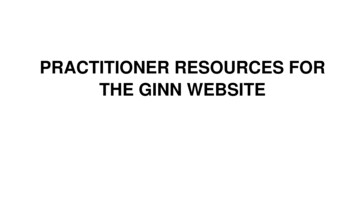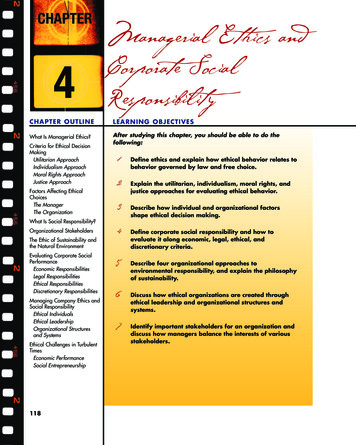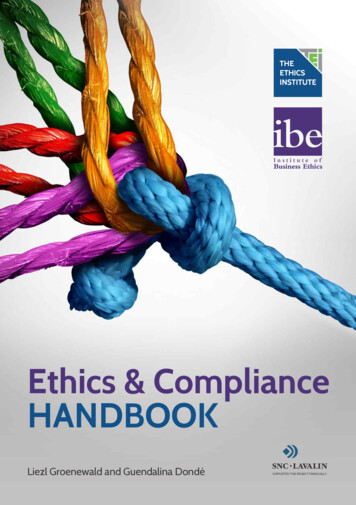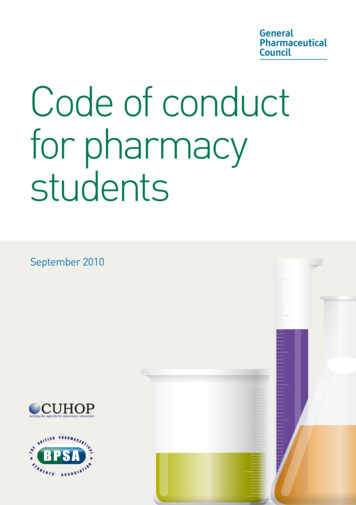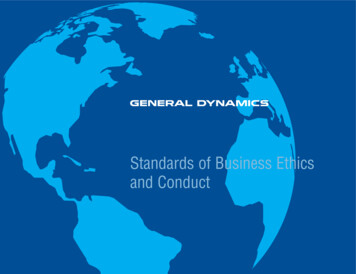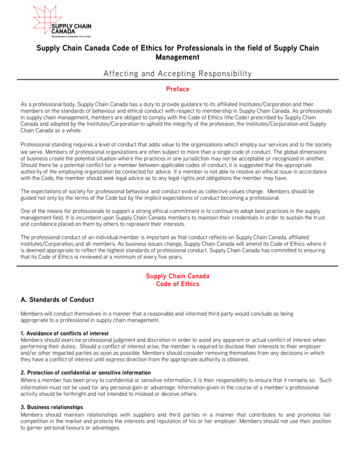
Transcription
Standards ofconduct, ethicsand performanceJuly 2012
Reprinted July 2012.The content of this booklet remains the sameas the previous September 2010 edition.
The General Pharmaceutical Councilis the regulator for pharmacists,The GeneralPharmaceuticalCouncilpharmacytechniciansand registeredis the regulatorfor pharmacists,pharmacypremisesin England,pharmacytechniciansScotlandandWales. As andpartregisteredof our role,pharmacypremises inEngland,weset the standardswhichgovernScotlandandthepracticeof Wales.pharmacists andpharmacy technicians.Standards of conduct, ethics and performance3
headingThis document sets out the standards of conduct, ethicsand performance that pharmacy professionals must follow.Pharmacy professionals are pharmacists and pharmacytechnicians who are registered with us.It is important that you meet our standards and that you areable to practise safely and effectively. Your conduct will bejudged against the standards and failure to comply could putyour registration at risk. If someone raises concerns aboutyou we will consider these standards when deciding if weneed to take any action.The work of a pharmacy professional can take many formsand you may work in different settings, including clinicalpractice, education, research and industry.4Standards of conduct, ethics and performance
headingIf you are a pharmacy professional these standards apply toyou, even if you do not treat, care for or interact directly withpatients and the public.As well as standards of conduct, ethics and performance, wepublish other standards which you need to consider togetherwith these standards.To help you to understand these standards, we havepublished a glossary of terms. We will also publish guidanceto advise you on what you will need to do to meet thesestandards.The glossary and our guidance can be found on our websiteat www.pharmacyregulation.orgStandards of conduct, ethics and performance5
headingThe seven principlesAs a pharmacy professional, you must:1. Make patients your first concern2. Use your professional judgement in the interests ofpatients and the public3. Show respect for others4. E ncourage patients and the public to participate indecisions about their care5. Develop your professional knowledge and competence6. Be honest and trustworthy7. Take responsibility for your working practices.6Standards of conduct, ethics and performance
headingMeeting the standardsWe do not dictate how you should meet our standards. Eachstandard can normally be met in more than one way and theway in which you meet our standards may change over time.The standards are of equal importance.You are professionally accountable for your practice. Thismeans that you are responsible for what you do or do not do,no matter what advice or direction your manager or anotherprofessional gives you. You must use your professionaljudgement when deciding on a course of action and you shoulduse our standards as a basis when making those decisions.You may be faced with conflicting professional or legalresponsibilities. In these circumstances you must considerall possible courses of action and the risks and benefitsassociated with each one to decide what is in the bestinterests of patients and the public.Standards of conduct, ethics and performance7
1Make patients your first concernThe care, well-being and safety of patients are at the heart of professionalpractice. They must always be your first concern. Even if you do not havedirect contact with patients your decisions or behaviour can still affect theircare or safety.You must:1.1 Make sure the services you provide are safe and of acceptable quality1.2 Take action to protect the well-being of patients and the public1.3 Promote the health of patients and the public1.4 Get all the information you require to assess a person’s needs in order to givethe appropriate treatment and care1.5 If you need to, refer patients to other health or social-care professionals, or toother relevant organisations1.6 Do your best to provide medicines and other professional services safely andwhen patients need them1.7 Be satisfied that patients or their carers know how to use their medicines1.8 Keep full and accurate records of the professional services you provide in aclear and legible form1.9 Make sure you have access to the facilities, equipment and resources you needto provide your professional services safely and effectively1.10 Organise regular reviews, audits and risk assessments to protect patient andpublic safety and to improve your professional services.8Standards of conduct, ethics and performance
2Use your professional judgement in the interests ofpatients and the publicBalancing the needs of individuals with those of society as a whole isessential to professional practice.You must:2.1 Consider and act in the best interests of individual patients and the public2.2Make sure that your professional judgement is not affected by personal ororganisational interests, incentives, targets or similar measures2.3 Make the best use of the resources available to you2.4 Be prepared to challenge the judgement of your colleagues and otherprofessionals if you have reason to believe that their decisions could affect thesafety or care of others2.5 In an emergency, consider all available options and do your best to provide careand reduce risks to patients and the public.Standards of conduct, ethics and performance9
3Show respect for othersShowing respect for other people is essential in forming and maintainingprofessional relationships.You must:3.1 Recognise diversity and respect people’s cultural differences and their right tohold their personal values and beliefs3.2 Treat people politely and considerately3.3 Not unfairly discriminate against people. Make sure your views about aperson’s lifestyle, religion or belief, race, gender reassignment, identity, sex andsexual orientation, age, disability, marital status or any other factors, do notaffect how you provide your professional services3.4 Make sure that if your religious or moral beliefs prevent you from providing aservice, you tell the relevant people or authorities and refer patients and thepublic to other providers3.5 Respect and protect people’s dignity and privacy. Take all reasonable stepsto prevent accidental disclosure or unauthorised access to confidentialinformation. Never disclose confidential information without consent unlessrequired to do so by the law or in exceptional circumstances3.6 Get consent for the professional services you provide and the patientinformation you use10Standards of conduct, ethics and performance
3.7 Use information you obtain in the course of your professional practice only forthe purposes you were given it, or where the law says you can3.8 Make sure you provide the appropriate levels of privacy for patientconsultations3.9 Maintain proper professional boundaries in your relationships with patientsand others that you come into contact with during the course of yourprofessional practice and take special care when dealing with vulnerablepeople.Standards of conduct, ethics and performance11
4Encourage patients and the public to participate indecisions about their carePatients and the public have a right to be involved in decisions abouttheir treatment and care. This needs effective communication. You shouldencourage patients and the public to work in partnership with you andothers to manage their needs.You must:4.1 Communicate effectively with patients and the public and take reasonablesteps to meet their communication needs4.2 Work in partnership with patients and the public, their carers and otherprofessionals to manage their treatment and care. Listen to patients and thepublic and respect their choices4.3 Explain the options available to patients and the public, including the risks andbenefits, to help them make informed decisions. Make sure the informationyou give is impartial, relevant and up to date4.4 Respect a person’s right to refuse to receive a professional service4.5 Make sure that information is appropriately shared with other health andsocialcare professionals involved in the care of the patient4.6 Consider and take steps, when possible, to address those factors that may bepreventing or deterring patients from getting or taking their treatment4.7 If a person cannot legally make decisions about their care, make sure that anyservice you provide is in line with the appropriate legal requirements.12Standards of conduct, ethics and performance
5Develop your professional knowledge and competenceUp-to-date and relevant professional knowledge and skills are essentialfor safe and effective practice. You must ensure that your knowledge,skills and performance are of a high standard, up to date and relevant toyour field of practice at all stages of your professional working life.You must:5.1 Recognise the limits of your professional competence. Practise only in thoseareas in which you are competent to do so and refer to others if you need to5.2 Maintain and improve the quality of your practice by keeping your knowledgeand skills up to date and relevant to your role and responsibilities5.3 Apply your knowledge and skills appropriately to your practice5.4 Learn from assessments, appraisals and reviews of your professionalperformance and undertake further education and training if necessary5.5 Undertake and keep up-to-date evidence of your continuing professionaldevelopment.Standards of conduct, ethics and performance13
6Be honest and trustworthyPatients and the public put their trust in pharmacy professionals. You mustbehave in a way that justifies this trust and maintains the reputation ofyour profession.You must:6.1 Act with honesty and integrity to maintain public trust and confidence in yourprofession6.2 Not abuse your professional position or exploit the vulnerability or lack ofknowledge of others6.3 Avoid conflicts of interest and declare any personal or professional interestsyou have. Do not ask for or accept gifts, rewards or hospitality that may affect,or be seen to affect, your professional judgement6.4 Be accurate and impartial when you teach and when you provide or publishinformation. Do not mislead or make claims that you have no evidence for orcannot justify6.5 Meet accepted standards of personal and professional conduct6.6 Comply with legal and professional requirements and accepted guidance onprofessional practice14Standards of conduct, ethics and performance
6.7 Keep to your commitments, agreements and arrangements to provideprofessional services6.8 Respond honestly, openly and politely to complaints and criticism6.9 Promptly tell us, your employer and all relevant authorities about anythingthat may mean you are not fit to practise or that may damage the reputationof the pharmacy professions. This includes ill health that affects your abilityto practise, criminal convictions and findings of other regulatory bodies ororganisations.Standards of conduct, ethics and performance15
7Take responsibility for your working practicesWorking in a team is an important part of professional practice and relieson respect, co-operation and communication between colleagues fromyour own and other professions. When you work as part of a team youare accountable for your own decisions and behaviour and any work yousupervise.You must:7.1 Practise only if you are fit to do so7.2 Make sure that you and everyone you are responsible for have the languageskills to communicate and work effectively with colleagues7.3 Contribute to the development, education and training of colleagues andstudents, and share your knowledge, skills and expertise7.4 Take responsibility for all work you do or are responsible for. Make sure thatyou delegate tasks only to people who are trained to do them, or who arebeing trained7.5 Make sure it is clear who is responsible for providing a particular service whenyou are working in a team7.6 Be satisfied that appropriate standard operating procedures are in place andare being followed7.7 Make sure that you keep to your legal and professional responsibilities and thatyour workload or working conditions do not present a risk to patient care orpublic safety16Standards of conduct, ethics and performance
7.8 Make sure that your actions do not stop others from keeping to their legal andprofessional responsibilities, or present a risk to patient care or public safety7.9 Make sure that all your work, or work that you are responsible for, is coveredby appropriate professional indemnity cover7.10 Make sure that there is an effective complaints procedure where you work andfollow it at all times7.11 Make the relevant authority aware of any policies, systems, working conditions,or the actions, professional performance or health of others if they may affectpatient care or public safety. If something goes wrong or if someone reports aconcern to you, make sure that you deal with it appropriately7.12 Co-operate with any investigations into your or another healthcareprofessional’s fitness to practise and keep to undertakings you give or anyrestrictions placed on your practice because of an investigation.Standards of conduct, ethics and performance17
18Standards of conduct, ethics and performance
More informationIf you would like copies of this document in Welsh, please go ics-and-performancewhere you can download a PDF. If you are seeking this document in otherformats, please contact our communications team:Email: communications@pharmacyregulation.orgIf you have any questions or comments about the content of the standards,please contact our Standards Team:Standards TeamGeneral Pharmaceutical Council129 Lambeth RoadLondonSE1 7BTPhone: 0203 365 3460Email: standards@pharmacyregulation.orgWe have also produced guidance on topics that you mayfind ceStandards of conduct, ethics and performance19
General Pharmaceutical Council129 Lambeth RoadLondonSE1 7BTPhone: 020 3365 3400 General Pharmaceutical Council 2012designed and produced by tangerine-uk.co.uk 01622 623780www.pharmacyregulation.org
pharmacy technicians and reistered pharmacy premises in nland, Scotland and ales s part of our role, we set the standards hich overn the practice of pharmacists and pharmacy technicians Standards of conduct, ethics and performance 3 The General Pharmaceutical Council is the regulator for pharmacists, pharmacy technicians and registered pharmacy .
